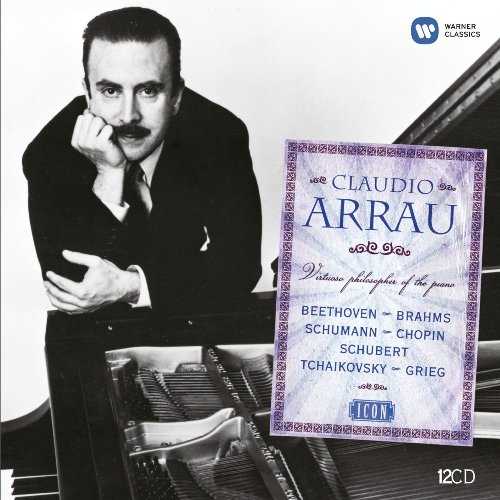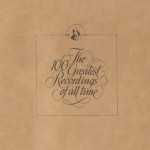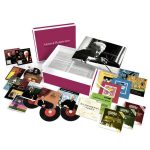
Audio CD
Number of Discs: 12 CD box set
Format: APE (image+cue)
Label: EMI Classics
Size: 2.73 GB
Recovery: +3%
Scan: yes
CD 01
Ludwig van Beethoven
Piano Concerto No. 1 in C, Op.15
01. I. Allegro con brio
02. II. Largo
03. III. Rondo: Allegro scherzando
Piano Concerto No. 2 in B flat, Op.19
04. I. Allegro con brio
05. II. Adagio
06. III. Rondo: Molto allegro
Philharmonia Orchestra
Alceo Galliera
07. 32 Variations in C minor, WoO.80
CD 02
Ludwig van Beethoven
Piano Concerto No. 3 in C minor, Op.37
01. I. Allegro con brio
02. II. Largo
03. III. Rondo: Allegro – Presto
Piano Concerto No. 5 in E flat, Op.73 “Emperor”
04. I. Allegro
05. II. Adagio un poco mosso
06. III. Rondo: Allegro – Più allegro
Philharmonia Orchestra
Alceo Galliera
CD 03
Ludwig van Beethoven
Piano Concerto No. 4 in G, Op.58
01. I. Allegro moderato
02. II. Andante con moto
03. III. Rondo: Vivace – Presto
Philharmonia Orchestra
Alceo Galliera
Piano Sonata No. 21 in C major, Op. 53 “Waldstein”
04. I. Allegro con brio
05. II. Introduzione: Adagio molto
06. Rondo: Allegretto moderato – Prestissimo
Piano Sonata No. 26 in E flat major, Op. 81a “Les Adieux”
07. I. Adagio – Allegro (Les Adieux)
08. II. Andante espressivo (L’Absence)
09. III. Vivacissimamente (Le Retour)
CD 04
Ludwig van Beethoven
Piano Sonata No. 23 in F minor, Op. 57 “Appassionata”
01. I. Allegro assai
02. II. Andante con moto
03. III. Allegro ma non troppo – Presto
Piano Sonata No. 22 in F major, Op. 54
04. I. In tempo d’un Menuetto
05. II. Allegretto
Piano Sonata No. 7 in D, Op. 10 No. 3
06. I. Presto
07. II. Largo e mesto
08. III. Menuetto: Allegro
09. IV. Rondo: Allegro
Piano Sonata No. 24 in F sharp, Op. 78
10. I. Adagio cantabile – Allegro ma non troppo
11. II. Allegro vivace
CD 05
Ludwig van Beethoven
Piano Sonata No. 28 in A major, Op. 101
01. I. Allegretto ma non troppo
02. II. Vivace alla Marcia
03. III. Adagio ma non troppo, con affetto
04. Allegro
Piano Sonata No. 31 in A flat major, Op. 110
05. I. Moderato cantabile molto espressivo
06. II. Allegro molto
07. III. Adagio ma non troppo
08. Fuga: Allegro ma non troppo
Piano Sonata No. 32 in C minor, Op. 111
09. I. Maestoso – Allegro con brio ed appassionato
10. II. Arietta: Adagio molto semplice e cantabile
CD 06
Johannes Brahms
Brahms: Piano Concerto No. 1 in D minor, Op.15
01. I. Maestoso GB-AYC-88-03494
02. II. Adagio GB-AYC-88-03495
03. III. Rondo: Allegro non troppo GB-AYC-88-03496
Philharmonia Orchestra
Carlo Maria Giulini
CD 07
Carl Maria von Weber
Konzertstück in F minor, Op. 79
01. Larghetto affettuoso
02. Allegro passionato – Adagio
03. Tempo di marcia – Più mosso
04. Presto giojoso
Philharmonia Orchestra
Alceo Galliera
Johannes Brahms
Piano Concerto No. 2 in B flat major, Op.83
05. I. Allegro non troppo GB-AYC-88-03324
06. II. Allegretto appassionato GB-AYC-88-03325
07. III. Andante* GB-AYC-88-03326
08. IV. Allegretto grazioso GB-AYC-88-03327
Raymond Clark, cello
Philharmonia Orchestra
Carlo Maria Giulini
CD 08
Pyotr Il’yich Tchaikovsky
Piano Concerto No. 1 in B flat minor, Op.23
01. I. Allegro non troppo e molto maestoso – Allegro con spirito 21.20
02. II. Andantino semplice – Prestissimo – Tempo I 7.46
03. III. Allegro con fuoco 7.06
Philharmonia Orchestra
Alceo Galliera
Edvard Grieg
Piano Concerto in A minor, Op.16
04. I. Allegro molto moderato – Cadenza – Tempo I
05. II. Adagio
06. III. Allegro moderato molto e marcato – Andante maestoso
Philharmonia Orchestra
Alceo Galliera
CD 09
Franz Schubert
3 Klavierstücke, D.946
01. Impromptu No. 1 in E flat minor
02. Impromptu No. 2 in E flat
03. Impromptu No. 3 in C
Fantasy in C “Wanderer”, D.760
04. Allegro con fuoco ma non troppo
05. Adagio
06. Presto
07. Allegro
08. Allegretto in C minor, D.915
09. March in E, D.606
CD 10
Franz Schubert
6 Moments musicaux, D.780
01. No. 1 in C
02. No. 2 in A flat
03. No. 3 in F minor
04. No. 4 in C sharp minor
05. No. 5 in F minor
06. No. 6 in A flat major
Frédéric Chopin
Piano Sonata No. 3 in B minor, Op.38
07. I. Allegro maestoso
08. II. Scherzo: Molto vivace
09. III. Largo
10. IV. Finale: Presto non tanto
11. Fantasy in F minor, Op. 49 13.11
CD 11
Frédéric Chopin
12 Études, Op.10
01. No. 1 in C
02. No. 2 in A minor
03. No. 3 in E
04. No. 4 in C sharp minor
05. No. 5 in G flat
06. No. 6 in E flat minor
07. No. 7 in C
08. No. 8 in F
09. No. 9 in F minor
10. No. 10 in A flat
11. No. 11 in E flat
12. No. 12 in C minor
12 Études, Op.25
13. No. 1 in A flat
14. No. 2 in F minor
15. No. 3 in F
16. No. 4 in A minor
17. No. 5 in E minor
18. No. 6 in G sharp minor
19. No. 7 in C sharp minor
20. No. 8 in D flat
21. No. 9 in G flat
22. No. 10 in B minor
23. No. 11 in A minor
24. No. 12 in C minor
3 Nouvelles Études
25. No. 1 in F minor
26. No. 2 in D flat
27. No. 3 in A flat
28. Allegro de concert in A, Op.46
CD 12
Robert Schumann
Piano Concerto in A minor, Op.54
01. I. Allegro affetuoso – Andante espressivo – Tempo I – Cadenza – Allegro molto
02. II. Intermezzo (Andantino grazioso)
03. III. Allegro vivace
Philharmonia Orchestra
Alceo Galliera
Carnaval, Op. 9
04. 1. Préambule
05. 2. Pierrot
06. 3. Arlequin
07. 4. Valse noble
08. 5. Eusebius
09. 6. Florestan
10. 7. Coquette
11. 8. Réplique
12. 9. Papillons
13. 10. A.S.C.H. – S.C.H.A. (Lettres dansantes)
14. 11. Chiarina
15. 12. Chopin
16. 13. Estrella
17. 14. Reconnaissance
18. 15. Pantalon et Colombine
19. 16. Valse allemande
20. 17. Paganini (Intermezzo)
21. 18. Aveu
22. 19. Promenade
23. 20. Pause
24. 21. Marche des »Davidsbündler« contre les Philistins
icon_claudio_arrau_virtuoso_philosopher_of_the_piano02.rar – 339.2 MB
icon_claudio_arrau_virtuoso_philosopher_of_the_piano03.rar – 158.7 MB
icon_claudio_arrau_virtuoso_philosopher_of_the_piano04.rar – 258.4 MB
icon_claudio_arrau_virtuoso_philosopher_of_the_piano05.rar – 138.9 MB
icon_claudio_arrau_virtuoso_philosopher_of_the_piano06.rar – 212.4 MB
icon_claudio_arrau_virtuoso_philosopher_of_the_piano07.rar – 287.2 MB
icon_claudio_arrau_virtuoso_philosopher_of_the_piano08.rar – 267.9 MB
icon_claudio_arrau_virtuoso_philosopher_of_the_piano09.rar – 147.4 MB
icon_claudio_arrau_virtuoso_philosopher_of_the_piano10.rar – 318.4 MB
icon_claudio_arrau_virtuoso_philosopher_of_the_piano11.rar – 259.4 MB
icon_claudio_arrau_virtuoso_philosopher_of_the_piano12.rar – 169.4 MB
Arrau: the EMI recordings
Despite a highly successful international career that spanned nearly eight decades and included thousands of concert appearances and an extensive catalogue of recordings, Claudio Arrau (1903-1991) never seemed to achieve the kind of popularity with the American public that Artur Rubinstein (1887-1982) or Vladimir Horowitz (1903-1989) did. Rubinstein, a generation older than Arrau, was the consummate extrovert and easy for audiences to love, whereas Horowitz, Arrau’s exact contemporary, was a brilliant recluse with a near-Lisztian aura that made him compellingly attractive. Arrau, a legendary virtuoso in his younger years who was trained by Martin Krause, the last student of Liszt, achieved fame in Europe playing complete cycles of Beethoven, Bach and Mozart, but didn’t become established in the States until 1941, long after Rubinstein and Horowitz had settled here. His repertoire was enormous, however, his attraction to the German classics, a trait shared with Schnabel and even more so with his other contemporary, Rudolf Serkin (1903-1991), stamped him to some extent as an “intellectual” pianist, the very antithesis of the daredevil Horowitz and charming Rubinstein. Arrau, who by no means restricted himself to Germanic repertoire, especially early on when he played Albeniz, Ravel, and Granados along with Beethoven, Brahms and Schumann, nevertheless epitomized the “serious” artist who sought to share his vision with an audience, but not to entertain them per se – a fact underlined when, later in his career, he dropped Ravel and the others from his programs and even stopped playing encores. He claimed later in life to have overcome the need to please his audience, a major step in artistic maturity wherein he could execute his musical vision uncompromised by the demands of ego. His recitals were for connoisseurs who appreciated the vast resources, both musical and technical, that he brought to the stage; and for those who were tuned in, they could be intensely involving artistic experiences.
Arrau recorded prolifically, beginning in 1927 with works uncharacteristic of his older years – Busoni’s Carmen Fantasy, Dance Russe from Stravinsky’s Petrushka, Balakirev’s Islamey – but also Liszt, Debussy and Chopin. He began recording Bach, Beethoven and Mozart for RCA after a famous Carnegie Hall concert in 1941 that launched his career in the States. After the War came a small treasure trove of recordings for Columbia, including gorgeous Debussy Images, Estampes, and Pour le Piano; the first two books of Albeniz’s Iberia; Chopin’s Preludes, Schumann’s Kreisleriana, and a riveting Waldstein sonata among a few other odds and ends. A landmark recording of the Liszt e-flat major concerto from 1952 was reissued by Sony along with several Hungarian Rhapsodies (Piano Concerto 1 / Hungarian Fantasy), and while that label has not re-released the aforementioned solo Columbia recordings, they’re available on a four-cd set from United Archives, “Birth of a Legend” (not available through amazon). Arrau left Columbia in 1952 and recorded briefly for Decca (a bristling Eroica Variations from this period is available on Steinway Legends: Claudio Arrau) before joining EMI in 1955, a relationship that was to last until 1962, and that yielded the material on this aptly named 12 disc set.
When Arrau joined EMI he was in his early fifties and at the top of his form, with the virtuoso aspect of his artistic personality well integrated with the insightful poet-philosopher. The balance between spontaneity and thoughtfulness here is nearly ideal, and the tendency to linger and probe excessively that was to become noticeable in some of the pianist’s later recordings for Philips is held in check. The Beethoven concertos are representative in this respect: the first three with Galliera have a Mozartian sparkle and rhythmic drive to them that’s missing from the over-polished Philips remakes with Haitink. While the third concerto with Haitink has an appealing sumptuousness about it, the edge is worn off compared to the flintier EMI reading; and the Emperor falls into the same category, if not even more so. Only the fourth with Haitink supercedes the EMI reading, mostly because the Philips sound is superior (the EMI fourth was the first of the concertos to be recorded in 1955 and the only one done in mono). There’s a generous assortment of solo Beethoven included in this set, virtually all of which is outstanding – but not all of it is necessarily superior to Arrau’s 1960’s recordings for Philips, one of the greatest Beethoven sonata cycles ever recorded (Beethoven Complete Piano Sonatas, Collector’s Edition). The sonatas Arrau recorded for EMI are among those that he seemed to favor; for example, he first recorded op. 10, no. 3 for German Radio in 1938, and the Waldstein and Les Adieux sonatas for Columbia in 1947 and 1949. In each of these cases, there’s an aggressiveness to the EMI recordings that give them a slight edge over the Philips’ remakes. Both readings of the Les Adieux, for example, begin in slow motion, but the EMI version is a bit brisker than the later Philips recording, which is nevertheless a beautiful account. Both op. 54 and op. 78 have incredible drive, but so do the Philips remakes. Over the years the EMI Appassionata has been singled out by critics for praise, and while it’s a distinguished reading, I think the Philips remake, which has tremendous heft, is a more fully realized performance. The late sonatas are less rhetorical and have more snap than the Philips remakes, especially op. 101, although their footprints are essentially the same. Arrau’s recording of the C minor variations on Philips is a beautifully balanced account, but the EMI reading, while organized along the same lines, has a remarkable energy about it that the pianist didn’t always exhibit in the studio.
Although Arrau often played Chopin in concert and recorded some of the etudes and other pieces as early as 1928, his name was never linked with Chopin in the way it was with Beethoven, Brahms or Liszt. He embarked on an ambitious plan to record the major works of Chopin when he signed with Decca, but somehow his way with Chopin never seemed to click the way, for example, Rubinstein’s did and the project was never finished. Fortunately, among the first things Arrau recorded when he joined EMI were the etudes which for many years were reference recordings of these challenging works. (Rubinstein only recorded a few of them and rarely played any in recital because he admitted that some were simply too difficult to do justice to.) Those who are familiar with Arrau’s interpretations won’t be surprised to find that his approach was to underline the musical elements rather than rattling them off as technical exercises. Nevertheless, there’s plenty of excitement, muscle and drama here, plus poetry without sentimentalism. Underneath everything is a sort of extravagance that I find very appealing, reflecting Arrau’s connection to the great players of the 19th century. The op. 25 etudes are tremendously powerful, especially the tenth which is a statement of epic proportions. I’ve never heard it played with such a buildup of tension, something Arrau was a master at. The three Nouvellles Etudes are beautifully played and the Allegro de concert is a dashing display of glitter that summons up the image of Chopin at the piano in one of his salon recitals. Just wonderful stuff.
The Chopin B minor piano sonata was recorded over four sessions between March and June of 1960, a seemingly long time for such an undertaking, which is perhaps why it doesn’t come together in a completely satisfying way. It may well be that Arrau was still recovering from the death of his mother in 1959, an event that he described as “the greatest shock in my life.” The first and fourth movements are impressively granitic in scope, and while the second movement has plenty of zip, the long introduction to the third is very slow, perhaps reflecting his recent loss. Interestingly, Arrau never recorded the second piano sonata. There’s an outstanding performance of the op. 49 Fantasy, almost matching the pianist’s incredible remake for Philips which I think is one of the great Chopin recordings of all time. There’s a good slug of Schubert here too, including a fine set of the Moments Musicaux, the three Klavierstucke (D946) and an athletic Wanderer Fantasy.
The other (i.e. non-Beethoven) concerto recordings included here are, to be truthful, a mixed bag; but this is consistent with Arrau’s concerto recordings in general, including his Philips remakes of all of these pieces. The earliest are the Grieg and Schumann, both of which are somewhat disappointing. The Grieg is burdened with excessive point-making whereas the Schumann, which flows more naturally, still falls short of Arrau’s best (see, for example,Schumann: Piano Concerto Op. 54; Brahms: Violin Concerto Op. 77 or the outstanding EMI dvd Schumann: Piano Concerto in A minor, Carnaval Op. 9 & Beethoven Piano Sonata No. 32 in C minor / Arrau). I’ve never been fond of Arrau’s ultra-rhapsodic treatment of the Brahms D minor concerto which I think lacks youthful passion and tension. Conversely, the pianist was made for the B flat major, although neither this reading with Giulini nor the later remake with Haitink demonstrate what Arrau could really do with this concerto. For this one must turn to his live recording with Alexander Gibson (Brahms: Piano Concerto No. 2; Schubert: Three Piano Pieces, D946) which is an absolute knockout. The Weber Konzertstuck, a glittery showpiece and a favorite of Arrau’s for quite some time, is a shade cooler than the blistering recording he made for RCA in 1946. The Tchaikovsky concerto was panned by Gramophone when it was first released in 1961, an opinion that I can’t say that I totally disagree with. While Arrau’s expansive conception is completely unlike the stereotypical readings of thunder and lightning that have been cranked out over the years, it’s too often at odds with the spirit of the music and ultimately is just too rhetorical.
Those who are new to Arrau, or only have a passing acquaintance with his work, will find this EMI set to be a fine introduction to his distinctive art. Arrau collectors, on the other hand, will be elated. While the Chopin etudes and Sonata et al have been available in EMI’s Great Recordings of the Century series, the Brahms concertos have been in the catalogue in one form or another all along and the Schumann and Grieg concertos were reissued on Testament a number of years ago, the Beethoven sonatas and concertos, which represent about half of these discs, have been out of circulation for twenty years or more. Having all of this material in one reasonably priced box was long overdue. This “Icon” set also includes Arrau’s famous 1939 Parlophone recording of Carnaval which has been available in a number of incarnations over the years. The overall sound picture is never less than good, especially considering the dates of these sessions. Many of the mono recordings were remastered a number of years ago (e.g., the Beethoven in 1991 for an Arrau set that was never released in the U.S.), and I assume EMI felt that the results couldn’t be improved upon – or they didn’t want to invest the money necessary to do another update. The rambling, overblown liner notes by Andre Tubeuf are among the worst I’ve seen for a retrospective such as this, exceeded only by the nonsensical notes accompanying the Arrau “Birth of a Legend” set, also written by Tubeuf. One extract will do: “And at this central moment in his destiny, when there was a fullness to his sound, an energy to his vision and his taste and a need to prove himself were intact, he still felt, having inherited a century of German music, that he had a century ahead of him to bring it to life!”
In summary, while there may be a number of duplications for collectors who already own the Arrau EMI recordings that have been available here over the years, the Beethoven and Schubert recordings, which have long been out of circulation, by themselves make this set an essential acquisition.
an invaluable collection
I really can’t add much to the two very full reviews of the previous reviewers, but I heartily endorse their enthusiasm for this box. Arrau was in mid-career at the time of most of these recordings (some Chopin and Schumann solo stuff is earlier) and for many of the concerto recordings, Walter Legge was at the helm to assure as good sound as could be gotten in those days — the late 1950’s to around 1960. The Beethoven and Brahms concertos alone are worth the price of the box — Galliera and Guilini are supportive partners, and while it’s true that the Philips sound of his later set was better, and he was excellently supported by Haitink, many critics have made the case that these EMI recordings sound a bit fresher and more spontaneous. I don’t know that I hear the difference in terms of musical quality — rather, here is one of the giants of the keyboard, one who always has musical reasons for his interpretive decisions, and so he’s ALWAYS interesting to hear. In addition to Beethoven and Brahms, there are concertos from around the same time (1960, give or take) by Schumann, Grieg, and Tchaikovsky, all well worth hearing. Some of the solo pieces show their age sonically a little bit — especially the stuff from 1939! — but most of the Beethoven sonatas here were recorded in the mid-1950’s and are in perfectly acceptable sound. Arrau’s Philips Beethoven recordings (sonatas and concertos) are available as a boxed set too. If you can afford it, get it as well — and then Brendel, Serkin (not quite complete), and then wait until EMI decides to remaster Kovacevich for a cheap price. It’s a golden time for piano fans!
Treasurable
The majority of these performances antedate Arrau’s Philips discography dating from the early 1960s. He recorded two Beethoven piano concerto cycles: the set with Alceo Galliera here is quicker, livelier and more virtuosic than his 1964 Concertgebouw set with Bernard Haitink with one exception: the concerto #4 with Haitink is slightly preferable at least because of the RCOA but the both conductors employ medium speeds and Arrau is quite poetic in both versions. I prefer the Emperor with Galliera-more dynamic and exciting, but also recommend Arrau’s live version with Boston/ Monteux in #5 and Munch in #4, recorded at the Tanglewood Festival. Of the nine Beethoven sonatas,I prefer the Waldstein and Appasionata here to the later Philips versions. The earlier sonatas are equally good, especially opus 10/3, but I do prefer the profound opus 110 and 111 on Philips slightly.
The Schubert on Icon is excellent. Most of it was not re-recorded. Best are the Wanderer Fantasy and the three Klavierstucke D 946, of which #3 is especially mesmerizing (although Michelle Boegner’s version on MHS remains unforgettable. As with his Philips versions of the Brahms concertos, Arrau is more convincing in #2 than #1. In #1, his first movement is a slow maestoso upon which Arrau insisted strongly. I prefer quicker tempi, e.g. those of Serkin/Ormandy and Szell, Fleisher/Szell, Curzon/Van Beinum and Szell, and Kovacevich/Davis. The Weber Konzertstucke and the Schumann Carnival are quite lovely, but the Schumann concerto is too slow for me c.f. Haskil/Otterloo, Fleisher/Szell, Kempff/Kubelik, Frager/Kempe, Serkin/Ormandy Kovacevich/Davis and Argerich/Rostropovich. The Chopin sounds more attractive to me than the Liszt, but I must recuse myself from that discussion, do not know them sufficiently.
All in all this Icon set is quite valuable, I believe.




Gracias… I keep on repeating myself but I can only be thankful
thank you
This guy’s mastery of dynamics (not just Beethoven’s markings, but his own as well) on the piano is fabulous; make me marvel.
It’s almost as if you could see the wheels in his head turning,
Pleasure-a-plenty!
Bob
your 500th message here :)
Wow! I didn’t realize I talk so much! Oh, well, just so long as you, Rach & Owl know I love this website is what matters to me.
Bob
P. S.: Arrau gets even better as I go through the links. On CD 4 now. Appx. 1 hour and 18 minutes each in APE.
ahahahahah….you’re currently No. 3
Whatever is 2nd (674 msg)
…and I am the one, who talks the most of all (1554 msg)
less talking – more posting ;)
Yeah Baby…. my words, really. In my youth I used to speak very less…one day a friend of my older brother, who was known to speak a lot of bullshit, asked me, why I would not speak too much. I was about 12-13 years old, my answer came instinctively and fast: “The one who speaks less also says less bullshit”.
He turned to red in the face and he wasn’t seen in hour house for a long time ;)
ahahah! right!
Rach, are you sure you are not Irish to talk a lot of blarney? But I forget, Italianos are close behind! hahahaha.
Congratulations on #500, Bob. That’s quite an achievement! :)
Pure gold, thank you.
I downloaded the two full Beethoven sonata discs (4 and 5).
Thanks.